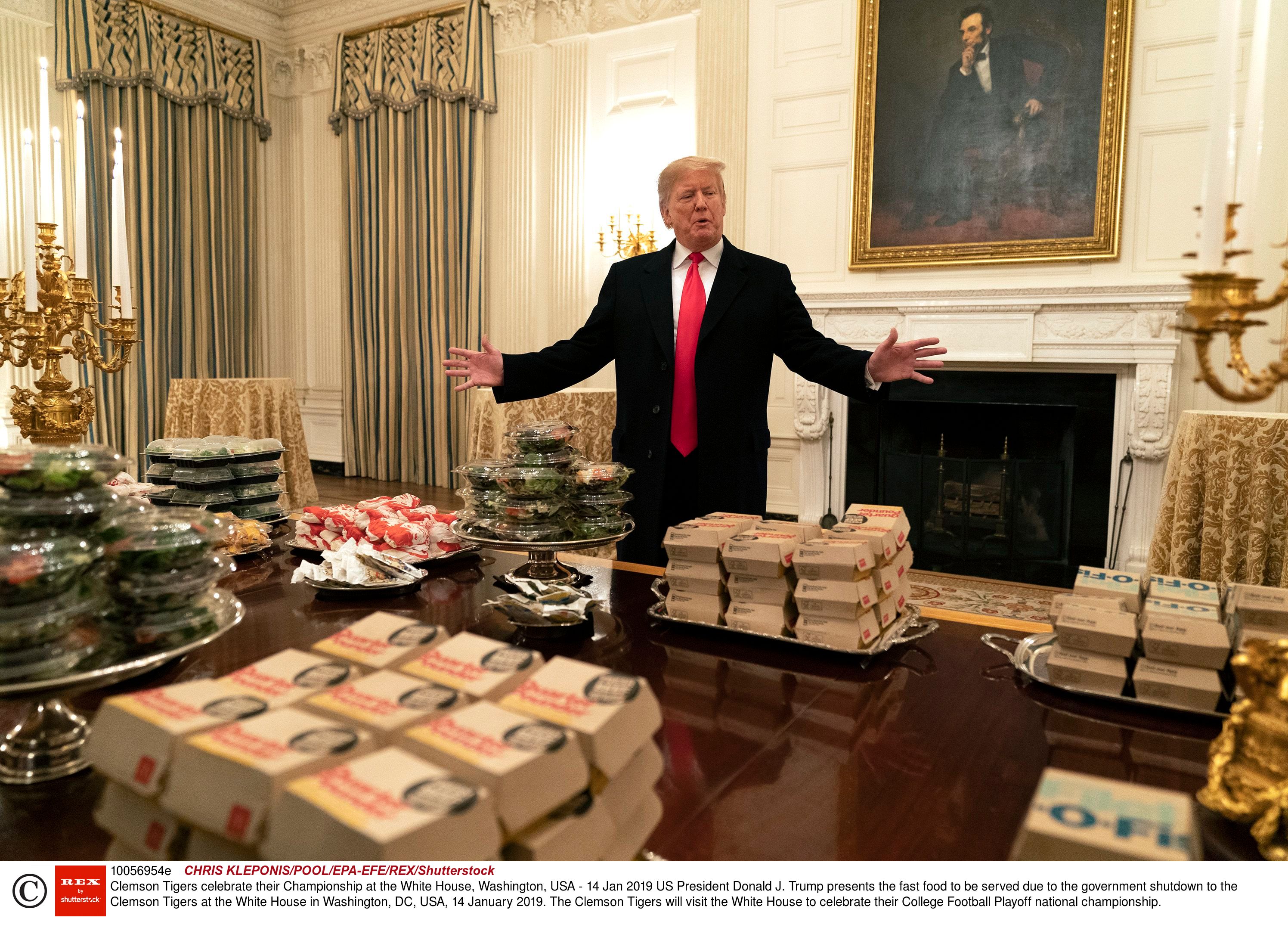
As the longest shutdown in the history of the US continues – at the time of writing it has gone on for 33 days – president Trump remains at odds with democrats over his demand for funding for a wall at the US-Mexico border.
Over 800,000 federal workers find themselves affected by the shutdown and many more people beyond the federal workers are feeling the effects. From the local café owner who usually relies on lunch business from the wardens in the nearby prison to operators wondering about the safety of the food reaching their kitchens, few people are left unaffected.
Who could forget President Trump posing behind the table laden with fast food when he resorted to bring in outside catering from McDonald’s to entertain the football team from Clemson University while White House chefs were furloughed, unavailable to cook for the occasion.
Future business
Across the foodservice sector operators of all sizes and shapes have been affected. “Operators, caterers who use government facilities such as museums and venues become more concerned about future business as the sales cycle is longer,” says consultant and FCSI associate John Reed, owner of Customized Culinary Solutions.
“They can’t view spaces for events such as weddings and fundraisers and that business turns elsewhere.”
Operators near popular sites run by the government are taking a direct hit with restaurants located inside the Smithsonian Institution in Washington, DC having closed at the start of this year due to the shutdown. Others, while they are able to remain open – such as Dukes Counter on the outside of the Zoo in DC – have seen a big drop in footfall as the attraction itself is closed to visitors.
Even away from the country’s political centre, operators are feeling the pressure. The 800,000 workers who would normally be spending, but with many unable to cover basic bills eating out is going to be the last thing on their minds. “Day to day foodservice business stops as non-government contracted employees are also affected. Then there is the trickle-down effect of suppliers, staffing companies and so on,” explains Reed.
Food safety
Scott Gottlieb, the commissioner of US Food and Drug Administration (FDA) caused some concern among consumers and operators when he tweeted to reassure people that high-risk inspections continued during the shutdown. “We’re taking steps to expand the scope of food safety surveillance inspections we’re doing during the shutdown to make sure we continue inspecting high risk food facilities,” he said.
But then he went on to say that of the 160 domestic food inspections the team would usually carry out only 1/3 were considered high-risk. Many people wondered, what slipped through the net?
The FDA later moved to clarify further in a statement: “All our work is important, but only some of our work is permitted to continue during a lapse in funding.
The mission-critical, public health activities that will continue include, among other things: maintaining core functions to handle and respond to emergencies – such as monitoring for and quickly responding to outbreaks related to foodborne illness and the flu, supporting high-risk food and medical product recalls when products endanger consumers and patients, pursuing civil investigations when we believe public health is imminently at risk and pursuing criminal investigations, screening the food and medical products that are imported to the US to protect consumers and patients from harmful products, and addressing other critical public health issues that involve imminent threats to the safety of human life.”
Coming together
In contrast to the stubborn reluctance emanating from those in power, the wider hospitality sector has come out in force to support those caught in the middle. Restaurants and operators across the country have opened their doors to federal workers and their families, offering free food and discounted meals.
Reed says it is no surprise that local breweries, bakeries and restaurants are feeding their neighbours. “We are not civil advocates, activists or out to change the world, we just cook,” he says. “It is an easy decision to make more and put a few more seats around the table. People need support and a good meal is an easy way to get them up and out of their reality for as long as you are at the dinner table.”
Chef Jose Andres who became known worldwide for his efforts to feed those impacted by Hurricane Maria in Puerto Rico in 2017 with his non-profit organisation World Central Kitchen.
Now, under the hashtag #chefsforfeds, he started a programme to help federal employees caught in the cross fire. First by delivering free sandwiches to furloughed federal employees and most recently by opening a world central kitchen in Washington, DC.
“More than 800,000 federal workers are without a job, millions of people are going through hard times,” said Andres in a video. “We believe no person should have to go through the pain of not knowing when they can feed the kitchen, so we are opening a World Central Kitchen in Washington, DC between congress and the White House. We will be open for any federal family that needs food,” he said adding that he hoped the symbolic position of the kitchen would make those in power think.
“I hope it will be a call to action for the senators and congressmen and especially president Trump to make sure we end this moment in American history where families are about to go hungry.”
World Central Kitchen executive director Nate Mook admitted that the situation is very different from the not-for-profit organisation’s usual projects. “This is a very different type of disaster, it is not a natural disaster and in many ways, it is a man-made disaster,” he said.
He believes the kitchen could bring people together. “Food is a great unifier; food has no identity and no politics, it is not partisan so we believe in building longer tables and bringing everyone to the table.”
Tina Nielsen
